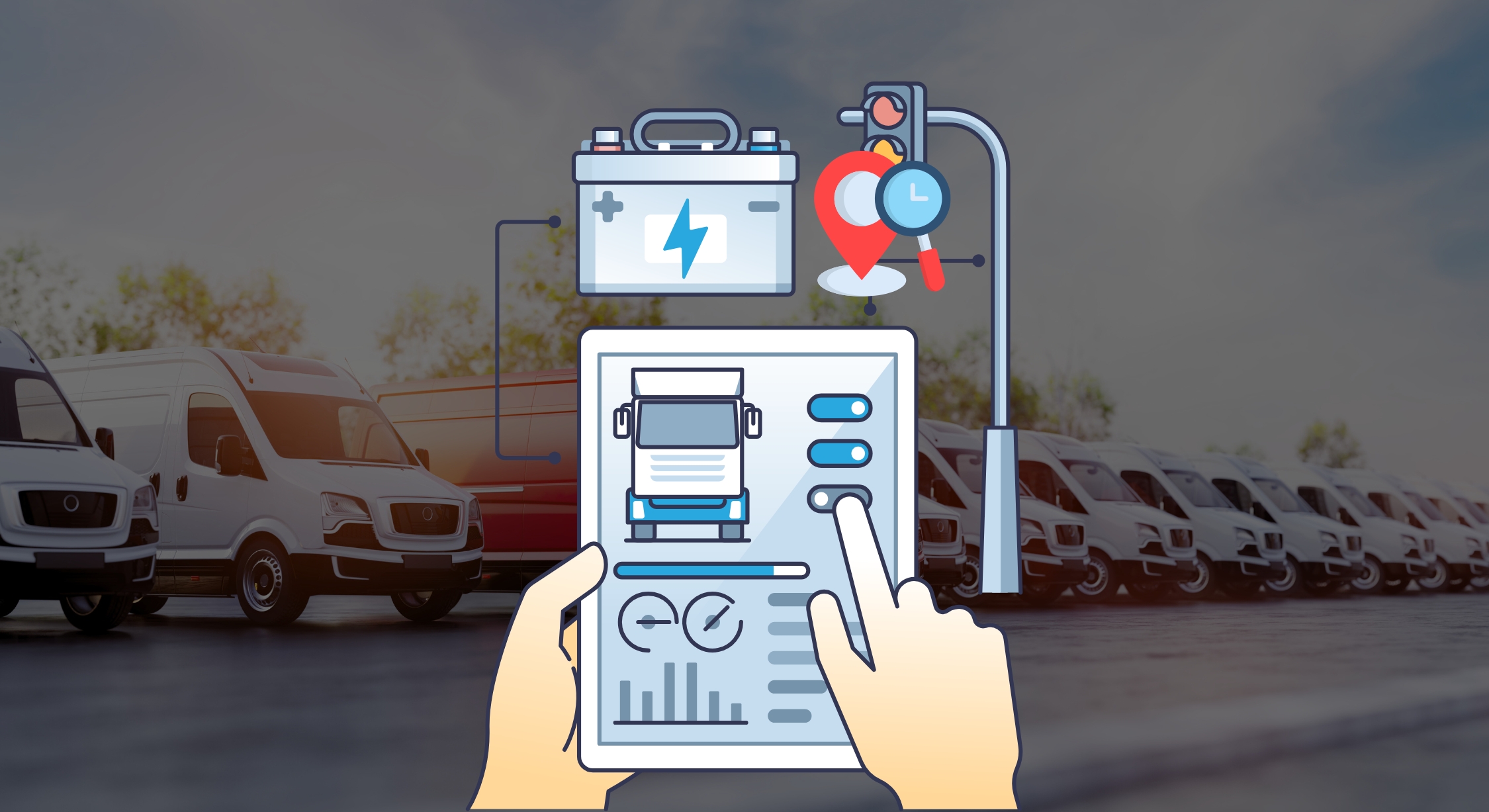With the global EV fleet expected to exceed 230 million by 2030, Experion is leading the way in delivering efficient, scalable fleet solutions to meet the demands of a sustainable future. With Experion’s expertise, EV fleet management goes beyond basic functionality – our solutions deliver real-time insights and proactive control that keep fleets running at peak performance.
Electric vehicles (EVs) are rapidly gaining traction as a sustainable and cost-effective transportation solution. As EV adoption continues to grow, fleet managers face unique challenges in optimizing their operations. Traditional fleet management strategies are insufficient to address the specific needs of electric vehicles, such as battery health monitoring, charging infrastructure management, and energy consumption optimization. Utilizing an EV management system empowers fleet managers to reduce emissions and contribute to environmental targets. Let’s look at the challenges first.
Challenges Faced by Fleet Managers in Managing EVs
- Battery Health and Range Worries: Keeping batteries in top shape and easing concerns about running out of charge are vital to keeping the fleet moving smoothly.
- Managing Charging Setups: Building and maintaining a dependable charging setup—balancing schedules, power loads, and costs—can be quite a juggling act.
- Real-time Tracking and Insights: Keeping an eye on each vehicle’s location, battery level, and energy use in real time helps keep routes efficient and downtime low.
- Driver Habits and Training: Guiding drivers on energy-saving driving techniques and smart charging habits can go a long way in conserving power and extending vehicle life.
What is EV Fleet Management Software?

EV Fleet Management Software is designed to address the above-mentioned challenges and empower fleet managers to make informed decisions. By leveraging advanced technologies such as IoT, AI, and cloud computing, this software offers a comprehensive suite of features to optimize EV fleet performance:
- Real-time Vehicle Tracking: Monitor the location and status of each vehicle in your fleet.
- Battery Health Monitoring: Track battery performance, identify potential issues, and optimize charging cycles.
- Charging Infrastructure Management: Schedule charging sessions, optimize energy consumption, and integrate with various charging providers.
- Energy Consumption Analysis: Analyze energy usage patterns, identify areas for improvement, and reduce operational costs.
- Driver Behavior Insights: Track driver behavior, provide feedback, and promote eco-driving practices.
- Predictive Maintenance: Use data-driven insights to predict maintenance needs and minimize downtime.
- Integration with Existing Systems: Seamlessly integrate with existing fleet management and telematics systems.
By adopting EV Fleet Management Software, fleet managers can unlock the full potential of their electric fleet, reduce operational costs, and contribute to a more sustainable future.
Fleet Electrification: Transitioning to Electric Vehicles
Fleet electrification is the transition from traditional fuel-powered vehicles to electric vehicles (EVs) within a fleet. This shift brings multiple benefits, such as reduced emissions, lower operating costs, and an enhanced brand image.
| Feature | Traditional Fleet Management | Fleet Electrification Tools |
| Vehicle Tracking
|
GPS tracking, geofencing, route optimization | Adds real-time battery monitoring, charging station locations, and availability |
| Fuel Management | Manages fuel cards, tracks fuel consumption | Tracks energy use, optimizes charging schedules, and provides cost analysis |
| Maintenance | Schedules maintenance, tracks service history | Adds battery health monitoring and predictive maintenance capabilities |
| Driver Behavior | Analyzes driving behaviors (e.g., speeding, harsh braking) | Provides energy-efficient driving tips and regenerative braking analysis |
Integrating Telematics and EV-Specific Metrics for Fleet Electrification
Telematics combined with EV-specific metrics is a powerful approach to optimize electric fleet operations. Here’s a brief overview:
Real-time Tracking & Battery Health:
- GPS & SOC Tracking: Pinpoint EV locations and monitor battery levels for effective route planning.
- Battery Health: Track battery degradation to optimize charging and predict maintenance needs.
Energy Consumption & Efficiency:
- Usage Analysis: Identify patterns to improve driving styles and charging efficiency.
- Regenerative Braking: Evaluate braking for optimal energy recovery.
- Charging Monitoring: Track rates and energy losses for infrastructure optimization.
Predictive Maintenance & Alerts:
- Maintenance Forecasting: Use data to predict issues and reduce downtime.
- Alerts: Get real-time notifications for critical issues like low battery or system failures.
Driver Behavior & Coaching:
- Eco-Driving Scores: Evaluate driving to encourage energy-efficient habits.
- Driver Training: Offer feedback to improve driving efficiency.
Charging Infrastructure Management:
- Station Optimization & Load Balancing: Locate charging stations based on fleet demand and manage load distribution.
Benefits of Integration:
- Lower Costs: Minimize energy, maintenance, and downtime expenses.
- Improved Efficiency: Optimize vehicle use, routing, and charging processes.
- Sustainability: Reduce emissions and promote eco-friendly practices.
- Informed Decisions: Use real-time data for smarter fleet management and infrastructure planning.
By integrating telematics with EV metrics, fleet managers can enhance operations and achieve environmental and cost benefits.
Why EV Fleet Management Software is Essential for Electric Fleets?
Enhanced Operational Efficiency
EV Fleet Management Software revolutionizes fleet operations by automating critical tasks and optimizing resource utilization. Key benefits include:
- Automated Scheduling: The software intelligently schedules charging sessions based on factors like vehicle usage, battery health, and energy costs, ensuring maximum uptime and minimizing downtime.
- Optimized Route Planning: By analyzing real-time traffic data, vehicle locations, and charging infrastructure availability, the software optimizes routes to minimize energy consumption and reduce travel time.
- Energy Consumption Monitoring: The software tracks energy usage patterns, identifies areas for improvement, and provides actionable insights to reduce energy costs and increase efficiency.
Sustainability & Environmental Benefits
EV Fleet Management Software plays a pivotal role in promoting sustainable transportation and reducing environmental impact:
- Reduced Emissions: By optimizing energy consumption and reducing idle time, the software helps minimize greenhouse gas emissions.
- Optimized Charging: The software enables efficient charging practices, such as scheduling charging during off-peak hours to reduce grid load and lower energy costs.
- Contribution to Environmental Goals: By adopting EV Fleet Management Software, organizations can actively contribute to global sustainability initiatives and demonstrate their commitment to environmental responsibility.
Cost Savings
EV Fleet Management Software offers significant cost savings through various mechanisms:
- Reduced Energy Consumption: By optimizing charging schedules and route planning, the software helps minimize energy consumption, leading to lower electricity bills.
- Predictive Maintenance: The software analyzes vehicle data to predict potential maintenance issues, allowing for proactive maintenance and reducing unexpected downtime.
- Increased Vehicle Lifespan: By optimizing charging cycles and battery health management, the software extends the lifespan of EV batteries, reducing replacement costs.
Key Features of EV Fleet Management Software

Battery Management
Efficient battery management is essential for ensuring the longevity and performance of EV fleets. Key components include:
- Battery Health Monitoring: Tracks battery degradation over time to optimize charging cycles, helping fleet operators balance charging frequency with battery lifespan. This feature provides insights into battery wear, alerting operators to potential issues before they impact vehicle performance.
- State of Charge (SOC) Tracking: Continuously monitors the current charge level, helping fleet managers ensure that vehicles have enough power to complete their planned routes without interruptions. SOC tracking also helps prevent deep discharge cycles, extending battery life.
- Temperature Management: Regulates battery temperature by controlling cooling and heating systems. This feature ensures that the battery remains within an optimal temperature range, minimizing the risk of overheating or overcooling. This improves performance and prevents early degradation due to thermal stress.
Charging Infrastructure Management
As the backbone of EV operations, charging infrastructure management allows fleets to integrate seamlessly with charging networks and optimize energy use:
- Charging Station Integration: Connects the fleet to various charging networks and providers, enabling centralized control of all charging sessions. Fleet operators can access nearby stations, manage session bookings, and ensure compatibility across different locations.
- Charge Scheduling: Optimizes charging times based on factors such as electricity rates, demand patterns, and fleet schedules. Charge scheduling reduces costs during peak hours and maximizes vehicle availability, particularly during high-demand periods.
- Real-time Charge Monitoring: Tracks charging status, energy consumption, and estimated time of completion for each vehicle. This feature allows fleet managers to monitor real-time charging progress, anticipate completion times, and manage vehicle availability efficiently.
- Load Balancing: Distributes charging loads across multiple vehicles to prevent grid overload and minimize peak demand charges. Load balancing optimizes energy use, ensuring that charging is done within grid capacity limits and reducing energy costs.
Route Optimization
Route optimization enhances efficiency by selecting the most energy-efficient paths, taking into account various real-time factors:
- Energy-Efficient Routing: Calculates routes based on factors like current battery range, charging station locations, traffic, and weather conditions. This feature minimizes energy consumption by optimizing routes to maximize battery life, extend range, and avoid areas with heavy traffic.
- Dynamic Route Adjustments: Re-calculates routes in real-time to adapt to unexpected changes, such as traffic congestion or detours. Dynamic adjustments allow drivers to stay on the most efficient path, reducing downtime and ensuring timely deliveries or service calls.
- Predictive Maintenance: Uses data from previous trips to predict maintenance needs based on usage patterns and historical trends. By anticipating issues, fleet managers can proactively schedule maintenance, reducing breakdowns and increasing fleet uptime.
Maintenance Tracking
Proactive maintenance tracking ensures that vehicles remain in top condition and downtime is minimized:
- Vehicle Health Monitoring: Continuously tracks essential vehicle parameters such as tire pressure, fluid levels, and engine performance. This feature alerts fleet operators when values fall outside normal ranges, helping maintain vehicle safety and reliability.
- Maintenance Scheduling: Automatically creates a maintenance calendar based on vehicle usage, mileage, and manufacturer recommendations. Scheduled maintenance ensures timely servicing, extending vehicle lifespan and preventing costly breakdowns.
- Work Order Management: Generates and manages work orders for each maintenance task. Fleet managers can track work order status, monitor service timelines, and ensure efficient repairs, minimizing vehicle downtime and improving overall operational efficiency.
Data Analytics & Reporting
Through analytics and reporting, businesses gain insights that drive improvements in fleet performance and sustainability:
- Energy Consumption Analysis: Analyzes energy usage patterns across the fleet, identifying trends and opportunities for energy savings. This data can inform charging schedules and route optimizations to minimize costs and reduce environmental impact.
- Emissions Reduction Reporting: Quantifies greenhouse gas reductions achieved by using EVs, supporting fleet managers in meeting sustainability goals and providing data for environmental reporting.
- Fleet Performance Metrics: Provides insights into overall fleet efficiency, including metrics on vehicle utilization, driver behavior, and fuel economy. These insights help fleet managers identify underperforming vehicles and optimize fleet usage.
- Customizable Reports: Generates reports tailored to specific business needs or regulatory requirements, allowing managers to track KPIs and share relevant data with stakeholders. Customizable reports provide targeted insights, facilitating data-driven decision-making.
Experion’s EV fleet solutions make it possible for every mile to contribute to a cleaner, more efficient world.
Benefits of Implementing EV Fleet Management Software
Improved Range Planning
EV fleet management software enhances range planning, ensuring vehicles are optimally prepared for each journey:
- Accurate Range Predictions: Provides precise range estimates by factoring in battery health, weather, traffic, and vehicle load, helping drivers confidently plan trips with a clear understanding of battery capacity.
- Optimized Charging Schedules: Plans charging schedules based on daily operational requirements, ensuring vehicles maintain sufficient range throughout the day and minimizing delays due to unexpected charging needs.
- Dynamic Route Adjustments: Adjusts routes in real-time to account for range limits and find the most efficient paths, reducing range anxiety and supporting timely deliveries.
Reduced Downtime
Reduced downtime translates to better fleet availability and cost efficiency:
- Predictive Maintenance: Analyzes vehicle data to predict maintenance needs, allowing proactive scheduling and minimizing the risk of unexpected breakdowns.
- Efficient Troubleshooting: Remote diagnostics enable quick identification and resolution of issues, reducing the need for in-person inspections and expediting repairs.
- Optimized Charging Processes: Manages charging operations to minimize delays and eliminate potential charging issues, keeping vehicles ready for use with minimal downtime.
Scalability for Fleet Expansion
The software is built to expand seamlessly as your fleet grows:
- Flexible Platform: Easily accommodates more vehicles and charging infrastructure as your fleet expands, adapting to increased operational demands.
- Scalable Data Management: Handles large volumes of data generated by a growing fleet, ensuring seamless data collection and analysis even with expanding fleet operations.
- Integration with Existing Systems: Integrates seamlessly with current fleet management tools and other business applications, creating a cohesive management ecosystem as the fleet scales.
Enhanced Compliance & Reporting
The software supports regulatory compliance and informed decision-making through robust reporting features:
- Regulatory Compliance: Helps ensure adherence to local, state, and federal regulations for EV fleets, simplifying compliance management and reducing the risk of penalties.
- Detailed Reporting: Generates comprehensive reports on metrics such as energy consumption, emissions, and vehicle performance, supporting sustainability and operational transparency.
- Data-Driven Decision Making: Provides actionable insights from data, enabling fleet managers to make informed adjustments that boost efficiency and reduce costs.
Overcoming Challenges in EV Fleet Management

Charging Infrastructure Limitations
One of the key challenges in EV fleet management is ensuring sufficient access to charging infrastructure. EV Fleet Management Software helps address this by:
- Optimizing Charging Schedules: Schedules charging sessions efficiently, ensuring maximum utilization of limited charging resources to keep vehicles ready for operations.
- Real-time Monitoring of Charging Stations: Tracks the availability and status of charging stations, helping drivers locate accessible charging points quickly and reducing downtime.
- Load Balancing: Distributes charging demand across multiple vehicles, preventing grid overload and maximizing the effectiveness of available charging stations.
Integration with Existing Fleet Systems
Integrating new EV fleet software with existing fleet management systems can be complex. Modern software solutions, however, are designed for flexibility and interoperability, with key integration capabilities such as:
- Data Synchronization: Ensures seamless data flow between EV management software and other systems, preventing inconsistencies and errors.
- API Integration: Uses APIs to facilitate communication and data exchange, allowing smooth integration with current fleet tools.
- Customizable Workflows: Adapts to existing processes, enabling a seamless transition without disrupting established workflows.
Protecting sensitive data is paramount in EV fleet management. Effective EV Fleet Management Software addresses security concerns by implementing robust measures:
- Strong Encryption: Encrypts data both in transit and at rest, safeguarding sensitive information from unauthorized access.
- Access Controls: Implements strict access control measures, ensuring that only authorized personnel can access critical data.
- Regular Security Audits: Conducts regular audits to identify and mitigate potential vulnerabilities.
- Compliance with Data Privacy Regulations: Ensures adherence to data privacy laws like GDPR and CCPA, enhancing trust and regulatory compliance.
Key Trends Driving the Future of EV Fleet Management Software

AI and Predictive Analytics
Artificial Intelligence (AI) and predictive analytics are revolutionizing EV fleet management by enabling proactive maintenance and informed decision-making. By analyzing vast datasets from vehicle sensors, telematics, and external sources, AI can predict potential issues before they escalate, reducing downtime and maintenance costs. For instance, AI-driven predictive maintenance can forecast battery degradation, allowing timely interventions to extend battery life and enhance vehicle reliability. According to a recent study, 55% of fleet managers expect AI to improve predictive maintenance and asset management, highlighting its growing importance in the industry.
Telematics Integration
Advanced telematics integration offers a complete perspective on both fleet and driver performance. Telematics systems collect real-time data on vehicle location, speed, battery status, and driver behavior, offering actionable insights to optimize operations. For example, real-time analytics enable fleet managers to respond swiftly to changing conditions, improving efficiency and safety. The seamless integration of telematics data with other fleet management systems is becoming a cornerstone of modern fleet management, allowing for detailed information about fleets and enhancing decision-making processes.
EV Ecosystem Expansion
The expansion of the EV ecosystem encompasses the growth of public and private charging networks, vehicle-to-grid (V2G) technology, and smart city integration. The proliferation of charging infrastructure ensures that EV fleets have ample access to power sources, reducing range anxiety and enhancing operational efficiency. V2G technology allows EVs to supply power back to the grid during peak demand, creating a symbiotic relationship between vehicles and energy systems. Additionally, integrating EV fleets with smart city initiatives facilitates optimized traffic management and energy distribution. For instance, AI-powered EV fleet management solutions can interact with traffic management systems, urban mobility solutions, and public charging stations, contributing to the development of smart cities.
These trends are collectively shaping a more efficient, intelligent, and interconnected future for EV fleet management, driving advancements that benefit both operators and the broader community.
Choosing the Right Partner for Developing EV Fleet Management Software

Selecting the ideal partner to develop EV fleet management software is crucial for creating a solution that meets your operational needs and keeps up with evolving technology. These important elements will assist you in making your decision:
Expertise in EV and Fleet Management Technology
Look for a partner with proven experience in EV and fleet management technology. The ideal provider should demonstrate a solid understanding of EV-specific challenges—such as battery management, charging infrastructure, and range optimization—as well as traditional fleet management competencies. This expertise ensures that your software solution is designed with an in-depth understanding of industry needs.
Advanced Capabilities in AI and Data Analytics
AI and data analytics are essential components of modern fleet management. Choose a partner skilled in implementing predictive analytics, machine learning, and real-time data analysis. These capabilities enable proactive maintenance, optimized routes, and data-driven decision-making, which are vital for maximizing efficiency and minimizing downtime.
Robust Telematics and Connectivity Solutions
To achieve seamless telematics integration, the partner should have expertise in connecting software with telematics systems, enabling real-time monitoring of vehicle location, performance, and driver behavior. Look for providers experienced with telematics platforms that provide end-to-end visibility into your fleet operations, helping you track and manage vehicles more effectively.
Strong Focus on Security and Compliance
Data security is paramount in fleet management, especially with the amount of sensitive information processed. Your development partner should prioritize strong encryption, access controls, and regular security audits to protect data. They should also ensure compliance with regulations such as GDPR and CCPA, as well as specific EV-related standards to avoid regulatory issues.
Flexible and Scalable Platform Design
Choose a partner capable of building a flexible, scalable solution to support fleet expansion. As your fleet grows, your software should easily accommodate new vehicles, data volumes, and expanded functionality. Scalable architecture helps future-proof your investment, ensuring it can adapt to emerging industry trends and business requirements.
Customer Support and Ongoing Maintenance
A reliable software partner should provide comprehensive support and maintenance services. From technical support to regular updates, ongoing assistance is essential to ensure that the software remains effective as technology and industry needs evolve. Ask about their post-launch support structure to make sure you’re covered beyond the initial development phase.
Proven Track Record and Client Success Stories
Finally, consider a partner with a proven track record and satisfied clients in the EV and fleet management space. Client success stories and case studies can offer insight into their ability to deliver impactful solutions that align with customer needs. This background can provide confidence that they have the experience and expertise necessary to meet your specific requirements.
Choosing the right development partner is about aligning with a team that understands your goals, shares your vision, and has the technical and industry expertise to bring it to life. With the right partner, your EV fleet management software can become a strategic asset that drives efficiency, sustainability, and growth.
Conclusion
EV fleet management software is a powerful tool for driving efficiency, sustainability, and cost savings in today’s evolving transportation landscape. By enabling precise control over battery health, charging schedules, route optimization, and maintenance tracking, this software empowers fleet managers to streamline operations and reduce downtime. Beyond operational benefits, EV fleet management software plays a key role in supporting environmental goals, reducing emissions, and contributing to a cleaner, greener future.
For fleet managers seeking better control and a positive environmental impact, adopting an EV fleet management solution is a step toward modernizing operations. The long-term benefits—ranging from optimized resource usage to enhanced fleet performance—translate into substantial ROI, making EV fleet management software an investment that pays off both financially and sustainably.
Explore EV fleet management solutions to see how they can elevate your fleet’s performance while aligning with future-forward goals. With the right tools, managing an electric fleet becomes not just efficient, but a strategic advantage for your business and the planet.
Key Takeaways
- As electric vehicle fleets grow, effective management is essential to boost efficiency and sustainability.
- Monitoring battery health helps extend battery life and reduces range anxiety.
- Efficiently scheduling and managing charging sessions helps cut down on energy costs.
- Real-time tracking and analytics allow fleet managers to optimize routes and reduce vehicle downtime.
- Driver training on eco-friendly practices improves energy use and extends vehicle life.
- Predictive maintenance reduces breakdowns, lowering maintenance costs and increasing uptime.
- Integrating EV management software with existing systems enhances overall fleet efficiency.
- Advanced data analytics help track fleet performance, monitor energy use, and reduce emissions.
- EV fleet management software supports compliance with environmental goals and regulations.
- Choosing a skilled development partner ensures software can evolve with the fleet’s needs and technological advancements.
Experion’s commitment to innovation ensures your EV fleet management software is not only cutting-edge today but designed for the evolving future of fleet technology. Your fleet’s future starts here. Connect with us to power up your EV management!

